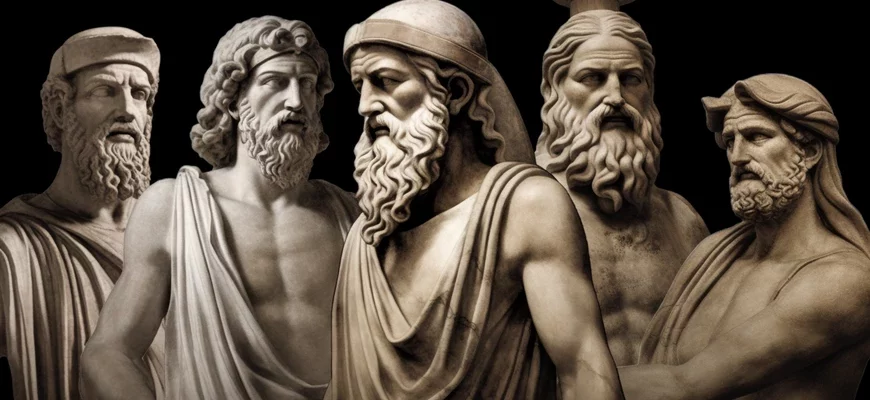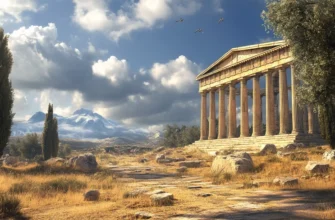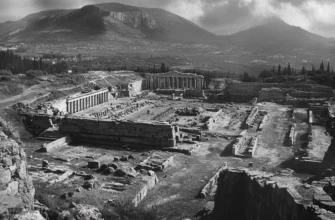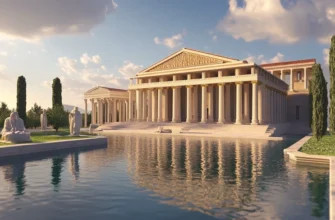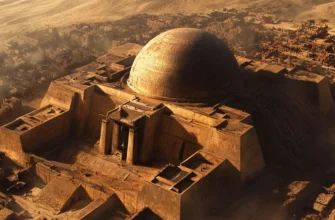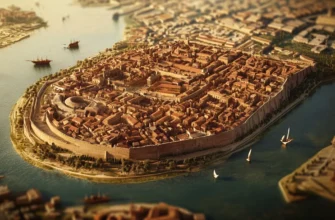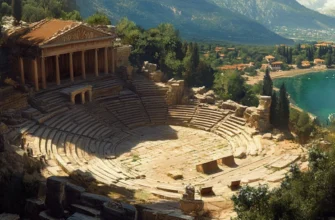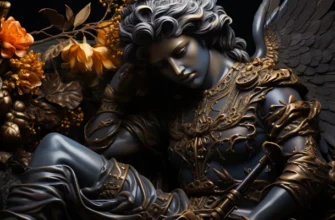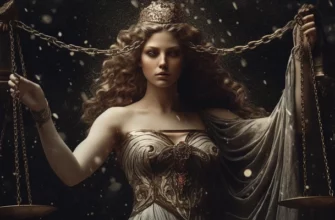Ancient Greek mythology is a complex system of religious stories about the lives and deeds of Greek gods and heroes. These myths were passed down from generation to generation as oral traditions and were reflected in literature, art, and architecture.
According to Greek mythology, the world was created out of chaos, and then gods appeared who controlled various spheres of life, such as the sea, the sky, the forests, and war. The gods were human-like but endowed with supernatural powers and qualities. They had their followers who prayed to them and asked for help.
Greek mythology also features heroes, people who distinguished themselves in battle or performed heroic deeds. They usually had their own patron gods and were often the subject of worship.
Greek mythology was an important part of the culture and identity of the ancient Greeks. It reflected their views on the world and human life. These myths became the basis for many literary and artistic works, which remain an important source of cultural heritage to this day.
Deities of Greek mythology:
Greek mythology includes a large number of gods and goddesses, each with their own characteristics and functions. Here are some of the most famous deities in Greek mythology:
Zeus – god of the sky and thunder, he was the chief god of Greece and ruler of Olympus.
Athena – goddess of wisdom, war, and craftsmanship, her symbols are the owl and the shield.
Apollo – god of music, prophecy, and healing, his symbols are the lyre and the laurel wreath.
Artemis – goddess of hunting and wildlife, her symbols are a bow and arrows.
Poseidon – god of the seas and earthquakes, he is the brother of Zeus and god of the underwater world.
Dionysus – god of wine and merriment, he is the patron of theater and the arts.
Hera is the goddess of marriage and family, she is the wife of Zeus and the queen of Olympus.
Hephaestus is the god of fire and blacksmithing, he made weapons and other items for gods and heroes.
Hercules is a demigod who performed 12 heroic deeds and became a symbol of strength and courage.
These are just a few of the many gods and goddesses who were worshipped in Greek mythology. Each of them had their own legends and myths associated with their characteristics and functions.
Heroes and their legends
The heroes of Greek mythology were people who had extraordinary abilities and strength, and their deeds and adventures became the basis for many legends and myths. Here are some of the most famous heroes and their legends:
Hercules – a hero with extraordinary strength and courage who performed 12 heroic deeds. He was the son of Zeus and a mortal woman, and the star Hercules is named after him.
Odysseus – a hero known for his adventures on his long journey home after the Trojan War. He conquered the Cyclops, met the enchanting Sirens, and returned to his home in Ithaca.
Achilles – a hero who was invincible in battle thanks to his invulnerable heel. He took part in the Trojan War and was killed by an arrow shot by Paris.
Theseus is a hero who killed the Minotaur and freed the Athenian princess Ariadne. He overcame many trials and fulfilled his duties to his people.
Jason is a hero who assembled a team of Argonauts and set out in search of the Golden Fleece. He overcame many trials and defeated mythical creatures in open combat.
These are just a few of the most famous heroes and their legends that are part of Greek mythology. Each of them had their own challenges and victories, which were related to their qualities and characters. The heroes of Greek mythology served as examples of courage, strength, and bravery for future generations.
The most famous legends about the heroes of Greek mythology, according to many, are related to the Trojan War. However, this is far from the only legend that has become part of Greek mythology. There are also well-known legends about the vicissitudes in the life of the famous musician and singer Orpheus, the adventures of the Argonauts, the just king Midas, and many others.
The heroes of Greek mythology not only became symbols of courage and strength, but were also used as a means of transmitting moral and ethical ideals. They were examples for other people, helped shape worldviews and thinking, and expanded ideas about human potential.
In Greek mythology, heroes were present not only in myths and legends, but also in art, literature, and other forms of culture. For example, Sophocles’ famous drama Antigone tells the story of a heroic girl who decided to obey the laws of divine justice.
Thus, heroes and their legends are an integral part of Greek mythology, which is important both for the cultural heritage of Ancient Greece and for contemporary culture.
The influence of mythology on the culture and history of Greece
Ancient Greek mythology had a significant influence on the culture and history of this country. It became an integral part of its life and beliefs, and also influenced the culture and art of many peoples of the world.
First of all, Greek mythology was an important factor in the formation of the cultural and religious identity of the ancient Greek people. The gods and heroes of Greek mythology were not just objects of belief for them, but symbols of important values that shaped their thinking and worldview.
Mythology also influenced the literature and art of ancient Greece. Many legends and myths were transformed into dramatic works and poetry, which later became classics of world literature. For example, the tragedies of Aeschylus, Sophocles, and Euripides were written based on myths and legends from Greek mythology.
In addition, Greek mythology influenced the architecture and art of ancient Greece. It became a source of inspiration for many artists who created works of art such as sculptures, frescoes, and mosaics. For example, famous Greek sculptures such as the Parthenon and the David of Milos were inspired by the gods and heroes of Greek mythology.
Mythology also influenced the politics and history of ancient Greece. Many states used mythology to justify their territorial claims and political actions. For example, Athens was considered the protector of the goddess Athena, and Sparta believed that its founder was the son of the god Poseidon. Mythology also influenced the military and political strategy of ancient Greek states, as military campaigns were often associated with legendary battles and heroic deeds.
In addition, Greek mythology has influenced modern culture and art. Legends and myths from Greek mythology have become popular themes in literature, film, television, and other art forms. Many modern works of art contain references to Greek mythology and use its symbols.
In conclusion, the mythology of Ancient Greece was an important element of the culture and history of this country. It influenced the religion, literature, art, politics, and history of ancient Greece, as well as modern culture and art. Its influence can still be felt today, and the myths and legends of Greek mythology remain an important part of world culture and art.
Art and architecture
The art and architecture of Ancient Greece had a profound influence on the development of world culture. Greek art was renowned for its beauty, harmony, and simplicity, and its works are considered timeless masterpieces.
Greek mythology was the main source of inspiration for artists and sculptors in Ancient Greece. Many works of art depicted gods and heroes from mythology. Sculptures were often placed in theaters, city squares, on the facades of buildings, and in other places of public life. The most famous of these are the statues of Zeus, Athena Parthenos, and Poseidon.
Ancient Greek mythology also influenced the architecture of the time. Buildings were large and monumental, using columns and architectural elements that resembled the forms of gods and heroes from mythology. One of the most famous examples of Greek architecture is the Parthenon, which was built in Athens in the fifth century BC.
In addition, Ancient Greek mythology influenced literature and theater. Greek theater was based on the myths and legends of Greek mythology, and many literary works of Ancient Greece were dedicated to the gods and heroes of mythology. One of the most famous poets of that time, Homer, created epic works such as the Iliad and the Odyssey, which reflect the lives and adventures of the heroes and gods of mythology.
Greek mythology also influenced the philosophy and science of that time. Many philosophers and scientists of Ancient Greece used mythology to explain nature, human life, and other phenomena of the world.
In general, the mythology of Ancient Greece had a strong influence on the culture and history of Greece and many other countries around the world. Its heroes, gods, and legends have been preserved in history and have become an integral part of world culture.
The popularity of Greek mythology in the modern world
Greek mythology has retained its popularity in the modern world and is an integral part of world culture. The legends, heroes, and gods of mythology are used in film, television, literature, and other publications.
For example, the film “300 Spartans” (2006) is based on historical events that took place in Ancient Greece in 480 BC, but many elements of mythology were included in the script. The TV series Mad Men (2010-2015) included many characters and stories from Greek mythology.
Greek gods and heroes have also become an integral part of popular culture. For example, the name Athena is used to refer to the capital of Greece, and the name Olympics comes from the mountain range Olympus in northern Greece, where, according to legend, the gods gathered.
In addition, Greek mythology is used in many sciences, such as literature, philosophy, psychology, and others. Many terms and concepts in these fields have their roots in Greek mythology.
Thus, Greek mythology remains a popular and important part of world culture and history even today.
In addition, Greek mythology has been a source of inspiration for many artists and designers. Elements of Greek mythology are used in the design of works of art, clothing, jewelry, and interiors. Greek mythology has also influenced architecture, which is evident in the decorative elements and composition of buildings.
Greek mythology is also reflected in science and technology. For example, there are space mission projects named after Greek gods and heroes, such as the Athena mission to Mars.
In addition, Greek mythology is used to study the history and culture of Ancient Greece, which is important for preserving the heritage and cultural identity of this country.
Thus, Greek mythology remains an important part of world culture and has a great influence on various fields of human activity. Its legends, heroes, and gods inspire people to creativity and exploration, as well as helping to preserve the heritage and history of Ancient Greece.
Conclusion
Ancient Greek mythology is one of the most famous and richest mythologies in the world. Its legends, heroes, and gods reflect human fears and dreams, telling stories of eternity, love, victory, and defeat. It has influenced the culture, art, literature, and history not only of Greece but of the entire world.
Greek mythology remains a source of inspiration for creative people, scholars, and researchers. It helps to preserve and understand the heritage and history of Ancient Greece, as well as enriching our culture and our understanding of the world. This shows that Greek mythology remains important and relevant to this day.
